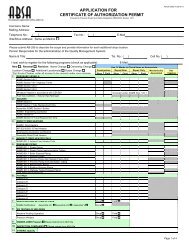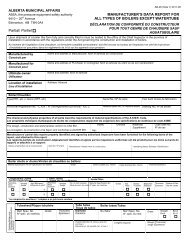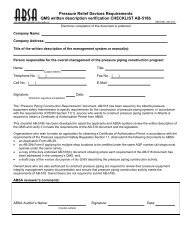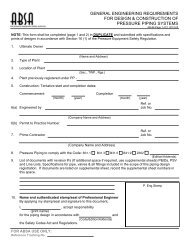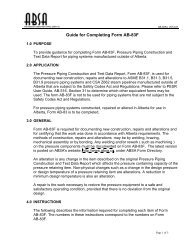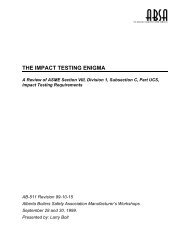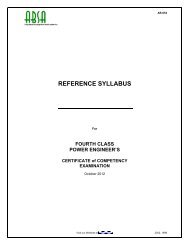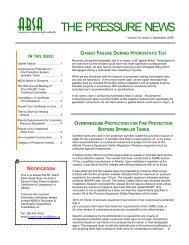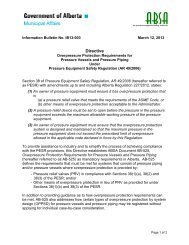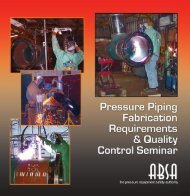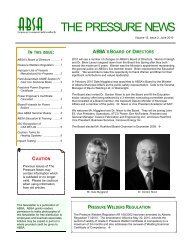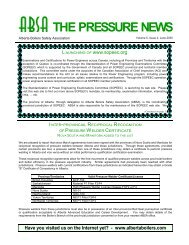The Baker Panel Report - ABSA
The Baker Panel Report - ABSA
The Baker Panel Report - ABSA
You also want an ePaper? Increase the reach of your titles
YUMPU automatically turns print PDFs into web optimized ePapers that Google loves.
workforce that it is not important to follow established requirements, thereby diminishing the overall effectiveness of a refinery’s process safetymanagement systems.All of BP’s U.S. refineries had extensive inspection and testing programs that qualified BP staff had implemented and that qualifiedcontractors had augmented, as necessary. In addition, all of these refineries had inspection scorecards that refinery personnel maintained tohighlight the status and performance of the inspection and testing program. Nonetheless, during their reviews the technical consultants foundextensive inspection and testing backlogs for fixed equipment, rotating machinery, and instrumentation systems at all of these refineries. Someinspections were past due for years. Examples of inspection and testing deficiencies at BP’s U.S. refineries are described in more detail in thetechnical consultants’ report attached as Appendix E.Critical alarms and emergency shut-down devices. Refining processes have instrumented control systems that monitor operatingparameters for various processes. Some of these parameters have associated alarms and serve interlock or safety shut-down functions.Operators must sometimes bypass or temporarily render these alarms and emergency shut-down devices inoperative so they can either betested to ensure dependable operation or repaired. Because the process unit typically remains in operation while these alarms or emergencyshut-down devices are temporarily out of service, the ability to monitor the process units during this period for possible process upsets orpossible need for shutdown of the process is diminished. As a result, it is important for a refinery to minimize the bypass time, communicateawareness of the degraded operational safety condition to all refinery personnel who need to know, and keep records documenting the rationalefor, and confirming the restoration of, the bypassed components.Based upon their sampling done at each of BP’s U.S. refineries, the technical consultants determined that Carson, Cherry Point, Toledo, andWhiting had insufficient procedures or did not execute established procedures for bypassing critical alarms, interlocks, and emergency shutdowndevices. In addition, numerous instances existed in which functional testing of these systems was overdue, increasing the probabilitythat latent failures will not be discovered or corrected and that the systems will not operate when called upon. <strong>The</strong> details relating to theconsultants’ finding are described in the technical consultants’ report attached as Appendix E.> Results from the process safety culture surveySeveral items in the process safety culture survey solicited impressions of personnel at BP’s U.S. refineries relating to testing, maintenance,and inspections of process safety-related devices and process equipment. <strong>The</strong> survey data from these items reveal mixed impressions: in someinstances, data indicate that respondents at BP’s U.S. refineries had quite positive process safety impressions; in other instances, dataindicate quite negative impressions. <strong>The</strong> following discussion focuses primarily on responses that signaled potential areas of concernregarding the regularity of testing process safety equipment, the regularity of maintaining process safety devices and equipment, and theprioritization of inspection and maintenance.Please read Section I of this report for a discussion of considerations and limitations relating to survey data and the <strong>Panel</strong>’s method ofanalyzing that data. <strong>The</strong> analysis of survey data contained in this section is qualified by, and should be read in conjunction with, the discussionof those considerations and limitations in Section I.Testing of process safety related devices and process equipment. Surveyed contractors and employees in six process safety functionalgroups often indicated their beliefs that interlocks, alarms, and other process safety-related devices were tested regularly. As shown in Table 40below, none of the identified respondents at Carson, Cherry Point, Texas City or Whiting had negative response rates in excess of 18 percent.Moreover, at Cherry Point, the negative response rate ranged from zero percent to a mere six percent. Survey data, however, revealed somepotential process safety concerns at the Toledo refinery: 41 percent of operators, 31 percent of maintenance/craft technicians, and 22 percentof engineering professionals disagreed or tended to disagree that process safety-related devices were tested regularly.Process Safety Management Systems C 139



